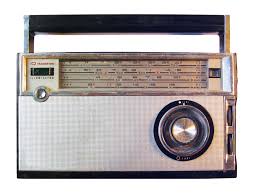
ಅಂದೊಂದಿತ್ತು ಕಾಲ. ಅವತ್ತಿಗೆ ರೇಡಿಯೋನೇ ಐಷಾರಾಮಿಯ ಸಂಕೇತವಾಗಿತ್ತು. ಮೂರ್ಖರ ಪೆಟ್ಟಿಗೆ (ಟಿವಿ) ಬರುವುದಕ್ಕೆ ಇನ್ನು ಕೆಲವು ದಶಕಗಳು ಬಾಕಿ ಇದ್ದವು. ಅವತ್ತಿನ ಮುಖ್ಯ ಮನರಂಜನೆ ಎಂದರೆ ಸಿನಿಮಾ - ಬೆಳ್ಳಿ ತೆರೆ. ವಾರಕ್ಕೊಂದು ಸಿನೆಮಾ ನೋಡದೇ ಇದ್ದವರು ಅಪರೂಪ. ಚಿತ್ರದ ಪಾತ್ರಗಳು, ಮುಖ್ಯವಾಗಿ ಕಥೆ ಜನರ ಚರ್ಚಾ ವಿಷಯವಾಗುತ್ತಿತ್ತು. ಕೌಟುಂಬಿಕ, ಸಾಮಾಜಿಕ ಜವಾಬ್ದಾರಿಗಳನ್ನು ಎತ್ತಿ ಹಿಡಿಯುವ ನಾಯಕ ಪ್ರೇಕ್ಷಕರಿಗೆ ಮಾದರಿಯಗುತ್ತಿದ್ದ. ಹಾಡುಗಳ ಸಾಹಿತ್ಯ ಅರ್ಥ ಪೂರ್ಣವಾಗಿರುತ್ತಿದ್ದವು. ಆ ಹಾಡುಗಳನ್ನು ಮತ್ತೆ ಕೇಳಬೇಕೆನಿಸಿದರೆ, ಆಕಾಶವಾಣಿಗೆ ಪತ್ರ ಬರೆದು, ಅಭಿಲಾಷ ಕಾರ್ಯಕ್ರಮದಲ್ಲಿ ಬಿತ್ತರಿಸುವರೋ ಎಂದು ವಾರಗಟ್ಟಲೆ ಕಾಯಬೇಕಾಗಿತ್ತು.
ಮನರಂಜನೆಗಾಗಲಿ, ಸುದ್ದಿ-ಸಮಾಚಾರಗಳಿಗಾಗಲಿ ಎಲ್ಲರೂ ಅವಲಂಬಿಸಿದ್ದ ಸಾಧನ ರೇಡಿಯೋ. ಮುಂಜಾವಿನಿಂದ ಮಲಗುವವರೆಗೆ ಸಂಗಾತಿ. ಬೆಳಿಗ್ಗೆ ಭಕ್ತಿ ಗೀತೆ, ರೈತರಿಗೆ ಸಲಹೆ, ಚಿಂತನ, ಸಂಸ್ಕೃತದಲ್ಲಿ ವಾರ್ತೆ, ಪ್ರದೇಶ ಸಮಾಚಾರ ಕಾರ್ಯಕ್ರಮ ಮುಗಿದು ಚಿತ್ರ ಗೀತೆಗಳು ಬರುವ ಹೊತ್ತಿಗೆಲ್ಲ ನಾವು ಶಾಲೆಗೆ ಹೊರಡುವ ಸಮಯ. ಸಾಯಂಕಾಲ ಆಟ ಮುಗಿಸಿ ಮನೆಗೆ ಬಂದರೆ ಆ ಹೊತ್ತು ವಾರ್ತಾ ಸಮಯ. ಹೀಗೆ ನಮ್ಮ ದಿನಚರಿ ರೇಡಿಯೋದ ಕಾರ್ಯಕ್ರಮಗಳೊಂದಿಗೆ ಹಾಸು ಹೊಕ್ಕಾಗಿತ್ತು. ನಿಮ್ಮ ವಿಷಯ ಹೇಗೋ ಗೊತ್ತಿಲ್ಲ, ಆದರೆ ನಮ್ಮ ಮನೆಯಲ್ಲಿ ಮಾತ್ರ ಟಿವಿ ಬಂದದ್ದು ನಾನು ಕಾಲೇಜು ಓದುವದಕ್ಕೆ ಮನೆ ಬಿಟ್ಟು ಹೊರಟ ನಂತರವೇ. ಅಲ್ಲಿಯವರೆಗೆ ನಮ್ಮ ಮನೆಯಲ್ಲಿದ್ದ ಏಕೈಕ ಇಲೆಕ್ಟ್ರಾನಿಕ್ ಉಪಕರಣ ರೇಡಿಯೋ. ಹಾಗಾಗಿ ನಮ್ಮ ಮನೆಯವರದ್ದು ಅದರೊಂದಿಗೆ ಭಾವನಾತ್ಮಕ ಸಂಬಂಧ. ಮನೆಯಲ್ಲಿ ಇರುವವರಿಗೆ ಮಾತ್ರವಲ್ಲ. ಹೊಲಗಳಿಗೆ ಹೋಗುವ ರೈತರು ತಮ್ಮ ಹೆಗಲ ಮೇಲೆ ಅಥವಾ ಸೈಕಲ್ಲುಗಳಿಗೆ ಸಿಕ್ಕಿಸಿಕೊಂಡು ರೇಡಿಯೋ ಕೊಂಡೊಯ್ಯುವುದು ಸಾಮಾನ್ಯ ದೃಶ್ಯ ವಾಗಿತ್ತು. (ಆ ರೇಡಿಯೋಗಳಿಗೆ ಬಳಸುತ್ತಿದ್ದ ದೊಡ್ಡ ಸೆಲ್ ಗಳು ಇಂದು ಕಾಣ ಸಿಗುವುದಿಲ್ಲ). ಇಳಿ ಸಂಜೆಯಲ್ಲಿ ಮನೆ ಹಿರಿಯರು ತಮ್ಮ ಮನೆಯ ಕಟ್ಟೆಯ ಮೇಲೆ ಅಥವಾ ಅಂಗಳದಲ್ಲಿ, ರೇಡಿಯೋನಲ್ಲಿ ಸ್ಟೇಷನ್ ತಡಕಾಡುತ್ತ ಕೂತಿರುವುದು ಇನ್ನೂ ಒಂದು ಸಾಮಾನ್ಯ ದೃಶ್ಯ ವಾಗಿತ್ತು. ಅದರಲ್ಲಿ ಬರುತ್ತಿದ್ದ ಹಾಡುಗಳು ದಣಿದ ಜೀವಗಳಿಗೆ ತಂಪನ್ನು ಎರೆಯುತ್ತಿದ್ದವು. "
ಹೂವು ಚೆಲುವೆಲ್ಲಾ ನಂದೆಂದಿತು ..." ಎಂದು ರೇಡಿಯೋ ಉಲಿದರೆ, ಒಲೆ ಮುಂದಿರುವ ಹೆಂಗಳೆಯರ ಕೆನ್ನೆ ಕೆಂಪಾಗುತ್ತಿದ್ದದ್ದು, ಒಲೆ ಬೆಂಕಿಗೋ ಅಥವಾ ಹಾಡು ಹುಟ್ಟಿಸುತ್ತಿದಿದ್ದದ್ದ ಭ್ರಮೆಗೋ! ಮುಂದಿನ ಹಾಡು "
ಕನ್ನಡ ನಾಡಿನ ಕರಾವಳಿ, ಕನ್ನಡ ದೇವಿಯ ಪ್ರಭಾವಳಿ ... " ಎನ್ನುವುದಾದರೆ ಭಾಷಾಭಿಮಾನದ ಜೊತೆಗೆ ನಮ್ಮ ನೆಲದ ಬಗೆಗಿನ ಪ್ರೀತಿಯೂ ಜಾಗೃತವಾಗುತ್ತಿತ್ತು. "
ಯಾರೇ ಕೂಗಾಡಲಿ, ಊರೇ ಹೋರಾಡಲಿ ..." ಹಾಡು ಬಂದಾಗ ಕೊಟ್ಟಿಗೆಯಲ್ಲಿದ್ದ ಎಮ್ಮೆ, ಹೆಮ್ಮೆಯಿಂದ ತಲೆ ತೂಗುತ್ತಿದ್ದದ್ದು ಯಾಕೋ?
ನನ್ನ ಬಾಲ್ಯದ ದಿನಗಳಿಗೂ ಹಿಂದಿನ ಕಾಲದಲ್ಲಿ, ರೇಡಿಯೋ ಮನೆ ಮನೆಗೆ ಬರುವುದಕ್ಕೆ ಮುಂಚೆ, ನಮ್ಮೂರಲ್ಲಿ ಇದ್ದಿದ್ದು ಒಂದೇ ರೇಡಿಯೋ. ಊರಿನ ಹಿರಿಯರ ನೆನಪಿನ ಪ್ರಕಾರ, ಅದನ್ನು ಊರ ಮಧ್ಯೆ ಇರುವ ಬೇವಿನ ಗಿಡಕ್ಕೆ ನೇತು ಹಾಕಲಾಗಿತ್ತು. ಆಗ ಅದರಲ್ಲಿ ಬರುತಿದ್ದ ಜನಪ್ರಿಯ ಗೀತೆ "
ನಾನೇ ರಾಜಕುಮಾರ ...". ಅಣ್ಣಾವ್ರು ಅವತ್ತಿನ ಕಾಲಕ್ಕೆ ಜನ ಪ್ರಸಿದ್ದ. ಅದು ಅರವತ್ತರ ದಶಕ. ಪಿ.ಬಿ.ಶ್ರೀನಿವಾಸ್ ರವರ ಜೇನಿನ ಕಂಠದಲ್ಲಿ ಬರುತ್ತಿದ್ದ ಹಾಡುಗಳು "
ಆಡುತಿರುವ ಮೋಡಗಳೇ, ಹಾರುತಿರುವ ಹಕ್ಕಿಗಳೇ ...", "
ಅಪಾರ ಕೀರ್ತಿ ಗಳಿಸಿ ಮೆರೆವ ಭವ್ಯ ನಾಡಿದು..." ಕೇಳುಗರ ಮೈ-ಮನ ಮರೆಸುತ್ತಿದ್ದವು. ಇತಿಹಾಸದ ತಿಳುವಳಿಕೆ, ಸಾಮಾಜಿಕ ಪ್ರಜ್ಞೆಯ ಜೊತೆಗೆ ಜೀವನದಲ್ಲಿ ಸಾರ್ಥಕ ಭಾವನೆಯನ್ನು ಮೂಡಿಸುತ್ತಿದ್ದವು.
ಸಮಯ ಸರಿದಂತೆ ಟಿವಿಯ ಅಬ್ಬರದ್ದಲ್ಲಿ ರೇಡಿಯೋ ಕಣ್ಮರೆಯಾಗಿತ್ತು. ಅದರ ಜೊತೆಗೆ ಅದರಲ್ಲಿ ಬರುತ್ತಿದ್ದ ಹಾಡುಗಳು ಮತ್ತು ಅವು ಹುಟ್ಟಿಸುತ್ತಿದ್ದ ಮಧುರ ಭಾವಗಳು ತೆರೆಯ ಮರೆಗೆ ಸರಿದು ಹೋದಂತೆ ಭಾಸವಾಗಿತ್ತು. ಆದರೆ ನೋಡಿ "
ಹಾಡು ಹಳೆಯದಾದರೇನು, ಭಾವ ನವ ನವೀನ ...". ಇವತ್ತು ಬೆಂಗಳೂರಿನಲ್ಲಿ ಎಫ್ ಎಂ ರೇಡಿಯೋ ಕೇಳುಗರಿಗೆ, ಹಳೆಯ ನೆನಪುಗಳನ್ನು ಮೆಲುಕು ಹಾಕಲಿಕ್ಕೆಂದೇ ಒಂದು ಚಾನೆಲ್ ಮೀಸಲಾಗಿದೆ. ಅದರಲ್ಲಿ ಕಾರ್ಯಕ್ರಮಗಳನ್ನು ನಡೆಸಿ ಕೊಡುವವರು ಮಾತಿಗೊಮ್ಮೆ ಹೇಳುತ್ತಾರೆ - ಕೇಳಿ, ಬೆಳ್ಳಿ ತೆರೆಯ ಬಂಗಾರದ ಹಾಡುಗಳು - ಅಂದಿಗೂ ಹಿಟ್, ಎಂದೆಂದಿಗೂ ಹಿಟ್! ಅದರಲ್ಲಿ ಬರುತ್ತಿರುವುದು ಅದೇ ಅಣ್ಣಾವ್ರ ನಾನ್-ಸ್ಟಾಪ್ ಹಾಡುಗಳು. ಪುಟ್ಟಣ್ಣ ಕಣಗಾಲರ ಚಿತ್ರಗಳ ಹಾಡುಗಳು. ಅಷ್ಟೇ ಅಲ್ಲ. ವಿಷ್ಣುವರ್ಧನ್, ಶಂಕರ್ ನಾಗ್, ಶ್ರೀನಾಥ್ ಅಭಿನಯದ ಚಿತ್ರಗಳ ಮರೆತು ಹೋದ ಎಷ್ಟೋ ಸುಮಧುರ ಹಾಡುಗಳು. "
ಗಗನವು ಎಲ್ಲೋ, ಭೂಮಿಯು ಎಲ್ಲೋ, ಒಂದು ಅರಿಯೇ ನಾ ..." ಹಾಡು ನಮ್ಮನ್ನು ಹರ್ಷದಲ್ಲಿ ತೇಲಿಸದೆ ಮುಗಿಯುವುದಿಲ್ಲ. ಕಳೆದ ಅರ್ಧ ಶತಮಾನದಲ್ಲಿ ಜನ ಜೀವನದಲ್ಲಿ ಸಾಕಷ್ಟು ಬದಲಾವಣೆಗಳಾಗಿವೆ ಆದರೂ ಕಾಲದ ತಾಂಡವ ನೃತ್ಯದಲ್ಲಿ ವಿನಾಶಕ್ಕೊಳಗಾಗದೆ ಉಳಿದು ತನ್ನ ಇರುವಿಕೆಯನ್ನು ಕಾಪಾಡಿಕೊಂಡು ಬಂದಿರುವ ರೇಡಿಯೋ ಮತ್ತು ಅದರಲ್ಲಿ ಬರುವ ಸುಮಧುರ ಗೀತೆಗಳು ಚಿರಂಜೀವಿಯೇನೋ ಅನ್ನಿಸುತ್ತದೆ.








